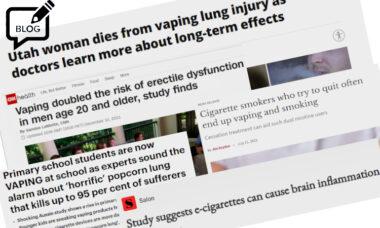 Bad news is like sex – it sells. A headline like the old East German classic “Half the harvest safely gathered in” was never going to make it onto front pages in the West, where readers had a choice over which paper to buy, or in post-Communist Germany. So perhaps it’s inevitable that scare stories about vaping greatly outnumber the positive ones in any significant sample of the world’s media.
Bad news is like sex – it sells. A headline like the old East German classic “Half the harvest safely gathered in” was never going to make it onto front pages in the West, where readers had a choice over which paper to buy, or in post-Communist Germany. So perhaps it’s inevitable that scare stories about vaping greatly outnumber the positive ones in any significant sample of the world’s media.
And, of course, for every reasoned, careful and balanced report – and there a few of those out there – there are hundreds dashed off by journalists with no specialist knowledge but a desire to get the attention-grabbing headline in print quickly then on to the next story about something completely different. No specialist knowledge, and almost certainly no specialist science knowledge in particular. Sadly, not many scientists take up journalism as a career.
And sadly, it has to be said, not every scientist is as rigorous as they might be – those who write their press releases even less so.
So, among scientific “discoveries” that have received substantial media coverage during the past 12 months, we have seen:
- Vaping can cause brain inflammation, and flavours affect the severity (if you’re a female mouse in a laboratory, but the headlines didn’t say that).
- Vaping “doubles the risk of erectile dysfunction” – a natural headline-grabber, that one, but deeply unscientific, being based solely on survey responses to one leading question.
- Vaping is a bigger stroke risk than smoking (oh no, it isn’t).
- Vaping might increase the risk of broken bones – or not; the study actually found that former vapers were slightly more at risk than current vapers (which might just be because they’re a bit older…).
- E-cigarettes are “linked” to teenage depression – even the Truth Initiative, which put this one out, had to admit: “It is unknown whether a causal relationship between nicotine and mental health conditions exists”. If there is one, who knows which leads to which?
We could go on. There are plenty more like that, some of which this blog has considered before. E-cigarettes are undoubtedly subject to some bad science and a lot of worse reporting.
But this particular list is interesting in another way too. Because, like many of the dubious reports themselves, it comes from a source that has been accused of starting with its conclusions already in place.
It’s a precis of a “master list of junk science” published this week by the American Council on Science and Health – which is variously described as “a research and education organization” (itself); “an industry-funded group that works to undermine not only climate change science, but the health threats associated with controversial company products” (Greenpeace); or a body which “spins science and pitches its services to the chemical, tobacco, pharmaceutical and cosmetic industries” (US Right to Know).
So who do you believe? As ever, you pays your money and you takes your choice. And remember it’s always worth asking the question: Who pays? (And just maybe: What else was going on, unreported, that East German harvest season?)
– Aidan Semmens ECigIntelligence staff






